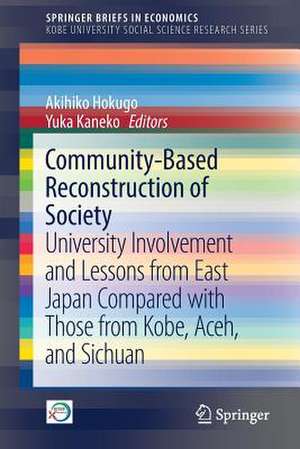Community-Based Reconstruction of Society: University Involvement and Lessons from East Japan Compared with Those from Kobe, Aceh, and Sichuan: SpringerBriefs in Economics
Editat de Akihiko Hokugo, Yuka Kanekoen Limba Engleză Paperback – 18 ian 2018
Din seria SpringerBriefs in Economics
-
 Preț: 444.35 lei
Preț: 444.35 lei -
 Preț: 264.79 lei
Preț: 264.79 lei - 15%
 Preț: 462.51 lei
Preț: 462.51 lei -
 Preț: 47.33 lei
Preț: 47.33 lei -
 Preț: 353.14 lei
Preț: 353.14 lei -
 Preț: 273.32 lei
Preț: 273.32 lei -
 Preț: 376.04 lei
Preț: 376.04 lei -
 Preț: 379.09 lei
Preț: 379.09 lei -
 Preț: 380.07 lei
Preț: 380.07 lei -
 Preț: 377.35 lei
Preț: 377.35 lei -
 Preț: 379.09 lei
Preț: 379.09 lei -
 Preț: 376.59 lei
Preț: 376.59 lei -
 Preț: 408.27 lei
Preț: 408.27 lei -
 Preț: 379.09 lei
Preț: 379.09 lei -
 Preț: 383.27 lei
Preț: 383.27 lei -
 Preț: 378.54 lei
Preț: 378.54 lei -
 Preț: 377.95 lei
Preț: 377.95 lei -
 Preț: 340.23 lei
Preț: 340.23 lei -
 Preț: 380.25 lei
Preț: 380.25 lei -
 Preț: 378.12 lei
Preț: 378.12 lei -
 Preț: 376.04 lei
Preț: 376.04 lei -
 Preț: 376.04 lei
Preț: 376.04 lei -
 Preț: 379.68 lei
Preț: 379.68 lei -
 Preț: 381.00 lei
Preț: 381.00 lei -
 Preț: 375.23 lei
Preț: 375.23 lei -
 Preț: 376.80 lei
Preț: 376.80 lei -
 Preț: 378.54 lei
Preț: 378.54 lei -
 Preț: 377.57 lei
Preț: 377.57 lei -
 Preț: 376.04 lei
Preț: 376.04 lei -
 Preț: 378.92 lei
Preț: 378.92 lei -
 Preț: 375.62 lei
Preț: 375.62 lei -
 Preț: 379.09 lei
Preț: 379.09 lei -
 Preț: 353.67 lei
Preț: 353.67 lei -
 Preț: 342.14 lei
Preț: 342.14 lei -
 Preț: 375.45 lei
Preț: 375.45 lei -
 Preț: 379.09 lei
Preț: 379.09 lei -
 Preț: 377.35 lei
Preț: 377.35 lei -
 Preț: 344.86 lei
Preț: 344.86 lei -
 Preț: 377.35 lei
Preț: 377.35 lei -
 Preț: 345.89 lei
Preț: 345.89 lei -
 Preț: 377.57 lei
Preț: 377.57 lei -
 Preț: 343.83 lei
Preț: 343.83 lei -
 Preț: 378.12 lei
Preț: 378.12 lei -
 Preț: 345.06 lei
Preț: 345.06 lei -
 Preț: 379.48 lei
Preț: 379.48 lei -
 Preț: 379.48 lei
Preț: 379.48 lei -
 Preț: 380.07 lei
Preț: 380.07 lei -
 Preț: 375.45 lei
Preț: 375.45 lei -
 Preț: 445.33 lei
Preț: 445.33 lei -
 Preț: 378.54 lei
Preț: 378.54 lei
Preț: 377.18 lei
Nou
Puncte Express: 566
Preț estimativ în valută:
72.19€ • 75.08$ • 60.50£
72.19€ • 75.08$ • 60.50£
Carte tipărită la comandă
Livrare economică 13-27 martie
Preluare comenzi: 021 569.72.76
Specificații
ISBN-13: 9789811054624
ISBN-10: 9811054622
Pagini: 97
Ilustrații: VIII, 95 p. 13 illus., 12 illus. in color.
Dimensiuni: 155 x 235 mm
Greutate: 0.16 kg
Ediția:1st ed. 2017
Editura: Springer Nature Singapore
Colecția Springer
Seriile SpringerBriefs in Economics, Kobe University Social Science Research Series
Locul publicării:Singapore, Singapore
ISBN-10: 9811054622
Pagini: 97
Ilustrații: VIII, 95 p. 13 illus., 12 illus. in color.
Dimensiuni: 155 x 235 mm
Greutate: 0.16 kg
Ediția:1st ed. 2017
Editura: Springer Nature Singapore
Colecția Springer
Seriile SpringerBriefs in Economics, Kobe University Social Science Research Series
Locul publicării:Singapore, Singapore
Cuprins
Part-1: 1. Challenges in Residents-Centered Reconstruction Process from a Major Disaster: Lessons Learned from the Great East Japan Earthquake.- 2. Reconstruction of Communities: Lessons from Hanshin-Awaji Earthquake and East Japan Earthquake.- 3. Evaluation of Six Years of Reconstruction Since the 2008 Sichuan Earthquake.- 4. The Recovery Phase in Post-Earthquake Christchurch, New Zealand.- Part-2: 5. The Role of Universities in the Reconstruction of Disaster-stricken Areas: Connecting the Local Needs with Seeds.- 6. The Role of Universities in Passing on Memories of Major Disasters, and Research Activities: Reflections Twenty Years after the Great Hanshin-Awaji Earthquake and Four Years after the Great East Japan Earthquake.- 7 Role of Universities in Disaster Management and Recovery from the Indian Ocean Tsunami: Perspective from Aceh, Indonesia.- 8. Community-Based Reconstruction of Society and University Involvement: a Coventry University Model.- Part-3: 9. Community-BuildingSurvey of Safety and Living for a Lively Future: Results from Taro, Kuwagsaki, and Unosumai Districts.- 10. Community-Building Survey of Safety and Living for a Lively Future : Results from the Hashikami district of Kesennuma city.
Notă biografică
Professor Akihiko Hokugo:
Research Center for Urban Safety and Security,Graduate School of Engineering, Kobe University Japan
Graduate School of Engineering, Kobe University, Japan
He has been conducting research activities on Fire Safety for Urban & Build Environment and Disaster Management.
Professor Yuka Kaneko:
Graduate School of International Cooperation Studies, Research Center for Urban Safety and Security,Kobe University Japan
She studies comparativelaw and governance issues in Asian region. Recent publication includes Kaneko, Y., Katsumi, & Toyoda T., eds. Asian Law in Disasters, Routledge, 2016
Research Center for Urban Safety and Security,Graduate School of Engineering, Kobe University Japan
Graduate School of Engineering, Kobe University, Japan
He has been conducting research activities on Fire Safety for Urban & Build Environment and Disaster Management.
Professor Yuka Kaneko:
Graduate School of International Cooperation Studies, Research Center for Urban Safety and Security,Kobe University Japan
She studies comparativelaw and governance issues in Asian region. Recent publication includes Kaneko, Y., Katsumi, & Toyoda T., eds. Asian Law in Disasters, Routledge, 2016
Caracteristici
Describes the interdisciplinary collaboration among scholars in disaster-prone areas of Asia, between Japanese and other Asian universities directly involved in the recovery phases of recent mega disasters Presents the results of a public forum which, in collaboration with the World Disaster Conference, launched the Sendai Framework for Disaster Risk Reduction Explores the collaborative role of academia in responding to social needs in emergencies caused by mega disasters
